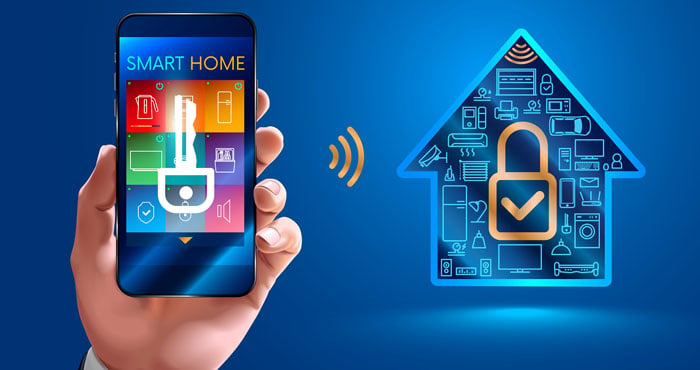In today's digital age, the security of our smart home setups is more crucial than ever. As we delve into the realm of smart technology, exploring the potential risks and vulnerabilities becomes imperative to safeguard our privacy and data. Let's embark on a journey to uncover the nuances of smart home security and discover ways to fortify our defenses.
As we navigate through the intricacies of smart home security, it's essential to stay informed and proactive in ensuring a safe and protected environment within our homes.
Importance of Smart Home Security
In today's digital age, the convenience of smart home technology comes with a pressing need for security. Ensuring the protection of your smart home setup is crucial to safeguarding your privacy, data, and overall safety.Smart home setups can be vulnerable to various risks, including hacking, data breaches, and unauthorized access.
When a smart home system is compromised, the consequences can be severe and far-reaching.
Potential Risks of Insecure Smart Home Setups
- Unauthorized Access: Hackers can gain access to your smart devices, cameras, or even your entire home network, compromising your privacy.
- Data Breaches: Personal information stored in smart home devices can be stolen and used for malicious purposes.
- Device Control: Hackers can take control of your smart devices, such as thermostats, door locks, or security cameras, putting your physical safety at risk.
Real-Life Incidents Related to Smart Home Security Breaches
- In 2019, a family in Oregon reported that their smart home security camera was hacked, and the hacker used the device to spy on them and even communicate with their child.
- In 2020, a vulnerability in a popular smart home hub allowed hackers to access users' personal data, including Wi-Fi passwords and device information.
- A study by the University of Michigan found that many smart home devices have security vulnerabilities that could be exploited by hackers to gain unauthorized access.
Common Vulnerabilities in Smart Home Devices
Smart home devices have become popular for their convenience and efficiency in managing household tasks. However, along with these benefits come potential security risks that users need to be aware of to protect their personal information and privacy.One common vulnerability in smart home devices is the lack of secure communication protocols.
Many devices communicate over unencrypted channels, making them susceptible to interception by hackers. This can lead to unauthorized access to sensitive data or control of the device itself.
Outdated Software or Firmware
Outdated software or firmware in smart home devices is another major security concern. Manufacturers may not provide regular updates or patches to address known vulnerabilities, leaving devices exposed to potential attacks. Hackers can exploit these outdated systems to gain access to the device and compromise its functionality.It is crucial for users to regularly check for updates from the device manufacturer and apply them promptly to ensure that their smart home devices are protected against the latest security threats.
Ways to Enhance Smart Home Security
Smart home security is essential to protect your data and privacy from potential cyber threats. By following best practices and utilizing additional security measures, you can significantly enhance the security of your smart home devices.
Using Strong, Unique Passwords
One of the most critical steps in securing your smart home devices is to use strong, unique passwords for each device. Avoid using default passwords or easily guessable combinations, and opt for complex passwords with a mix of letters, numbers, and special characters.
Enabling Two-Factor Authentication
Two-factor authentication adds an extra layer of security by requiring a second form of verification, such as a code sent to your phone, in addition to your password. This significantly reduces the risk of unauthorized access to your smart home systems, even if your password is compromised.
Network Security for Smart Homes
Securing your home network is crucial for ensuring the overall security of your smart home setup. A vulnerable network can lead to unauthorized access to your devices, compromising your privacy and safety.
Securing Your Wi-Fi Network
One of the first steps in enhancing smart home security is securing your Wi-Fi network. Here are some methods to prevent unauthorized access:
- Change the default SSID and password: Make sure to change the default network name (SSID) and password that came with your router. Use a strong, unique password that includes a combination of letters, numbers, and special characters.
- Enable WPA2 or WPA3 encryption: Ensure that your Wi-Fi network is encrypted with WPA2 or the newer WPA3 protocol to protect your data from being intercepted by unauthorized users.
- Disable remote management: Disable the remote management feature on your router to prevent hackers from accessing your router settings over the internet.
Virtual Private Networks (VPNs)
Another effective way to enhance smart home network security is by using a virtual private network (VPN). A VPN encrypts your internet connection and routes it through a secure server, masking your IP address and making it harder for hackers to intercept your data.
A VPN adds an extra layer of security to your smart home network, especially when accessing sensitive information or controlling smart devices remotely.
Privacy Concerns with Smart Home Technology
As smart home technology continues to evolve, privacy concerns have become a major issue for users. The interconnected nature of smart home devices raises questions about data collection practices and potential privacy risks.
Data Collection Practices by Smart Home Companies
Smart home companies often collect data on user behavior, preferences, and routines to improve the functionality of their devices. While this data can enhance the user experience, it also raises concerns about privacy and security.
Potential Privacy Risks
- Unauthorized access to sensitive information: Hackers may exploit vulnerabilities in smart home devices to access personal data such as security camera footage or sensitive conversations.
- Data breaches: In the event of a data breach, personal information stored by smart home companies could be compromised, leading to identity theft or other forms of cybercrime.
- Third-party sharing: Smart home companies may share user data with third parties for marketing or research purposes, without explicit consent from users.
Tips to Protect Your Privacy
- Secure your network: Use strong passwords, enable encryption, and regularly update your router to prevent unauthorized access to your smart home devices.
- Review privacy settings: Check the privacy settings on your smart home devices and adjust them to limit data collection and sharing.
- Update firmware: Keep your smart home devices up to date with the latest firmware updates to patch security vulnerabilities and protect your privacy.
- Limit data sharing: Be cautious about granting permissions for third-party apps or services to access your smart home data, and review privacy policies before sharing any information.
Ultimate Conclusion

As we conclude our exploration of smart home security, it's evident that vigilance and adherence to best practices are key in safeguarding our smart devices. By implementing robust security measures and staying informed about potential threats, we can create a secure and resilient smart home environment for ourselves and our loved ones.
FAQ
What are the common vulnerabilities in smart home devices?
Common vulnerabilities in smart home devices include insecure network connections, lack of encryption, and outdated software.
How can I enhance the security of my smart home devices?
You can enhance security by using strong, unique passwords, keeping software updated, and enabling two-factor authentication.
Why is network security important for smart homes?
Network security is crucial for overall smart home security as it helps prevent unauthorized access to devices and data breaches.






